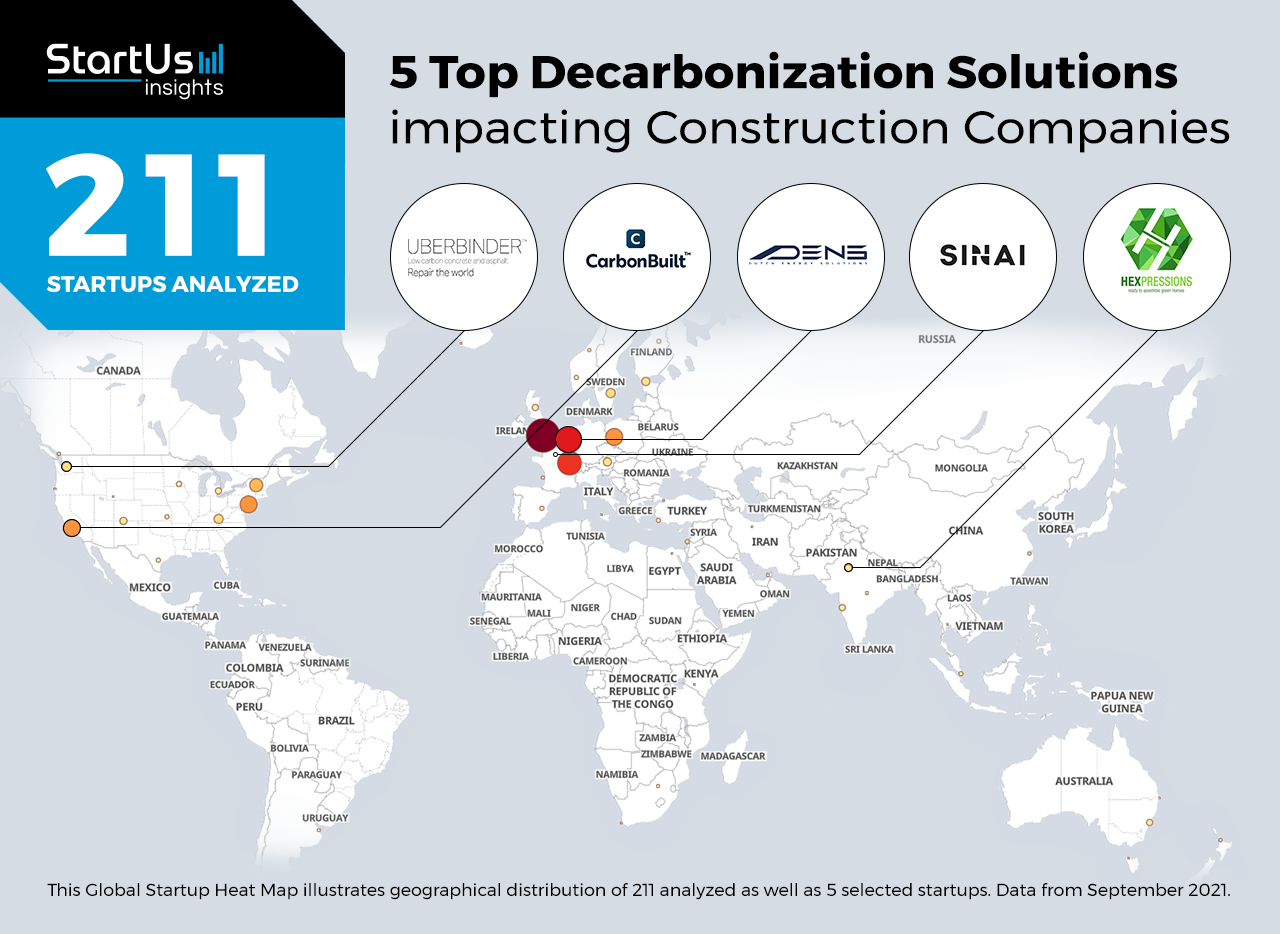Staying ahead of the technology curve means strengthening your competitive advantage. That is why we give you data-driven innovation insights into the construction industry. This time, you get to discover 5 hand-picked decarbonization solutions impacting construction companies.
Out of 211, the Global Startup Heat Map highlights 5 Top Decarbonization Solutions impacting Construction Companies
The insights of this data-driven analysis are derived from the Big Data & Artificial Intelligence-powered StartUs Insights Discovery Platform, covering 2 093 000+ startups & scaleups globally. The platform gives you an exhaustive overview of emerging technologies & relevant startups within a specific field in just a few clicks.
The Global Startup Heat Map below reveals the distribution of the 211 exemplary startups & scaleups we analyzed for this research. Further, it highlights 5 construction startups that we hand-picked based on criteria such as founding year, location, funding raised, and more. You get to explore the solutions of these 5 startups & scaleups in this report. For insights on the other 206 decarbonization solutions, get in touch.
DENS develops Zero-Emission Liquid Fuel
Although electricity provides an alternative to directly burning fuels, using electrical equipment in construction sites remains a challenge. Startups develop solutions that provide eco-friendly alternatives to petroleum-based power sources. These solutions provide on-demand power for construction sites, allowing builders to perform internal site logistics without carbon emissions.
Dutch startup DENS develops zero-emission liquid fuel to supply power at any location in construction sites. The startup’s DENS Hydrozine is a power generator that supplies energy using hydrozine, a liquid hydrogen carrier. The user-friendly generator generates hydrogen from the formic acid and directly converts it into clean electrical energy in a fuel cell. The system does not produce any harmful emissions, which makes it a sustainable and silent alternative for diesel-powered generators.
CarbonBuilt produces Low-Carbon Concrete Products
While concrete is both the literal and figurative foundation of the construction industry, it is also a major contributor to greenhouse gas (GHG) emissions. Particularly, concrete production releases a high amount of carbon during the clinker formation process. At the same time, the carbonization of concrete requires carbon dioxide to form calcium carbonate. Startups capitalize on this relationship to transform carbon emissions into low-carbon concrete products.
US-based startup CarbonBuilt develops technology to utilize carbon emissions from construction and other manufacturing industries to develop green construction materials. The startup’s Reversa process reduces emissions through a combination of utilization, by permanently embedding CO2 into the concrete, and avoidance, by reducing CO2 emissions associated with raw materials. The startup adds portlandite, also known as calcium hydroxide, to reduce the cement content in the concrete mix during production. After the concrete formation, the company uses waste CO2 emissions from industries to cure the concrete.
Hexpressions manufactures Honeycomb Paper Panels
Any construction project, including residential homes, causes carbon emissions at multiple activities during the process. Further, construction activities like transportation, energy consumption, and deconstruction emit a large amount of carbon into the environment. Therefore, it is necessary to look for sustainable alternatives for construction materials and processes. Startups design sustainable construction materials that use low or zero-carbon solutions that allow companies to perform construction faster and with a smaller carbon footprint.
Indian startup Hexpressions develops honeycomb paper panels that are lightweight, eco-friendly, flexible, and provide sufficient insulation. The startup’s composite panels enclose recycled paper and honeycomb material between two concrete blocks. The panels replace traditional building materials, such as cement, concrete, and rock wool mineral, and lower the carbon footprint of construction projects. Further, the startup builds modular buildings using panels wherein the honeycomb panels are installed with a metal support structure over a concrete base to speed up construction.
Uberbinder develops Concrete Binders
Concrete and asphalt are energy-intensive materials that emit the most GHG emissions. Cement production requires very high temperatures which releases large amounts of carbon into the atmosphere. Hence, there is a need to replace such materials with more sustainable options which address environmental concerns and make the production process eco-friendly. Startups discover new ways of producing concrete and asphalt by precisely replacing the steps that are responsible for toxic emissions.
US-based startup Uberbinder develops technology to produce low-carbon concrete binders and asphalt. The startup replaces cement, bitumen, and other modified sulfur binders with a low-carbon sulfur-based organic polymer binder. The solution does not require external heating, unlike cement, which significantly reduces the energy input and carbon impact of construction companies. The Uberbinder technology uses readily available organic, industrial, and agricultural by-products that repurpose toxic municipal wastes, such as plastics, into stronger and more climate-resilient concrete and asphalt.
Sinai builds Emissions Analysis Software
Construction companies often fail to comply with environmental regulations since they do not have adequate tools to track their carbon emissions. Since each task involves multiple teams, it is difficult to track the environmental impact for each of them. Hence, startups build tools that quantify carbon emissions for the entire construction value chain using a single platform. Such tools enable construction companies to visualize the impact of different activities and redesign processes accordingly.
French startup Sinai develops emission analysis software for construction projects. It collects operational data like emission limits, produced emissions across the organization’s supply chain. It then forecasts baseline data like operation cost, mitigation opportunities, and carbon credit benefits as well as helps companies achieve internal and external emission targets with decarbonization budgeting. In addition to mitigating risk and emissions, the startup provides GHG data services that enable successful measurement and decarbonization.
Discover more Construction Startups
Construction startups such as the examples highlighted in this report focus on biomaterials, circular construction, and 3D printing. While all of these technologies play a major role in advancing the construction industry, they only represent the tip of the iceberg. To explore more construction technologies, simply get in touch to let us look into your areas of interest. For a more general overview, you can download our free Construction Innovation Report to save your time and improve strategic decision-making.









